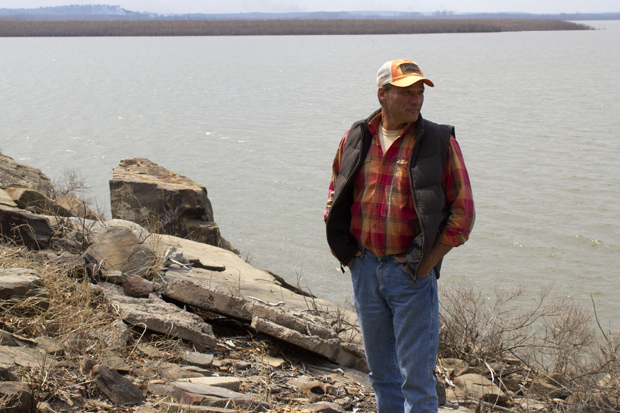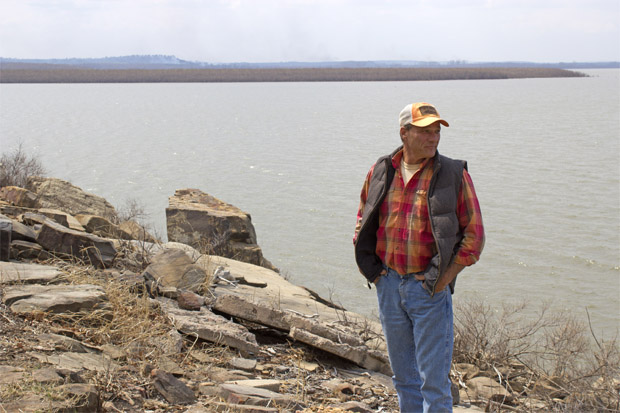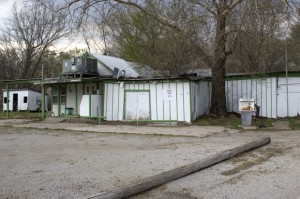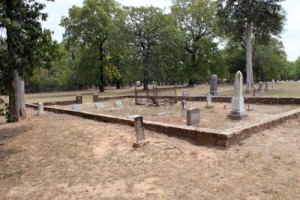
Rick Geisler, manager of Wah-Sha-She Park in Osage County, stands on the shore of Hula Lake.
Logan Layden / StateImpact Oklahoma


Rick Geisler, manager of Wah-Sha-She Park in Osage County, stands on the shore of Hula Lake.
Logan Layden / StateImpact Oklahoma

Logan Layden / StateImpact Oklahoma
Rick Geisler, manager of Wah-Sha-She Park in Osage County, stands on the shore of Hula Lake.
When budget cuts led the Oklahoma tourism department to find new homes for seven state parks in 2011, two of them went to Native American tribes. Both are open and doing well, but each has faced its own difficulties in the transition.
Of the seven former state parks, only Wah-Sha-She Park near Pawhuska closed during its transfer to new management.
From fall 2011 until spring 2012, no one could enjoy the unique Hula Lake sunsets from the park’s rocky shoreline, or camp at the handful of sites in this remote patch of well-maintained land carved into the wilderness in northern Osage County.
“We had some difficulty, internally — our own branches of government,” Raymond Lasley, Executive Advisor of Programs for the Osage Nation, says. “Members of congress were saying, ‘Why would we want to take on a park that loses money annually?’”
Lasley says former Chief John Red Eagle wanted to take the park over in 2011, but it was a tough time economically and the Osage Nation Congress was concerned about the cost of bailing out the State of Oklahoma.
The delay wasn’t just an inconvenience for park-goers, it was the final death knell for one of the only stores anywhere near the park.

Logan Layden / StateImpact Oklahoma
Jimmy Edens had to close this bait shop/gas station shortly after Wah-Sha-She closed in 2011.
“We ended up just having to close that store up there,” says Jimmy Edens, who now runs Jimmy’s Place, a restaurant in the tiny community of Whippoorwill, Okla. “We sold bait and all that stuff. They closed the park and it just kind of went downhill.”
The Osage Nation Congress eventually decided to fund the park. Its manager, Rick Geisler, remembers the day Wah-Sha-She reopened.
“I happened to drive by the gates up there that we had locked, and there were people already lined up waiting for it to open up,” Geisler says. “We opened it up about noon. It seemed like it was part of the Oklahoma land run. Everybody was just rushing to get to a spot.”
The transition from state control to tribal control was rocky at Wah-Sha-She, but the park has rebounded since.
“We had a two-day concert. Each year we have a noodling contest,” Geisler says. “We try to have things for the kids year-round, little fishing derbies up here. Or, you know, a flea market vender.”
The other park taken over by a tribal government is 200 miles south, in the heart of the Chickasaw Nation. Boggy Depot Park is both a Civil War battle site and home to the grave of revered Choctaw Chief Allen Wright. The Choctaw Nation Manages the cemetery.

Joe Wertz / StateImpact Oklahoma
Choctaw Chief Allen Wright and his family are buried in the historic cemetery near Boggy Depot, which is now managed by the Choctaw Nation.
Chief Wright’s family has been pleased with the condition of the park since the Chickasaw Nation got control. The tribe says there have been a number of improvements and additions, and attendance is up.
But when StateImpact visited Chickasaw Governor Bill Anoatubby in August 2011, he had grander visions for the park.
“We’re going to make it more of an attraction,” he said. “Our hope is to maybe do some restorations or recreations of some of the historic buildings.”
While the Chickasaw Nation now manages Boggy Depot, it still doesn’t own the land. The tribe hoped the ownership of the land would be transferred along with the park’s management responsibilities. Officials at the tribe and the state Tourism and Recreation Department expected the Oklahoma Legislature to quickly approve the land transfer, but it didn’t.
The debate on the state House floor in 2013 centered around whether it is right — or legal — to give the tribe the land for free.
In an email to StateImpact, Anoatubby says the Chickasaw Nation is now “working with the State of Oklahoma to develop a mutually beneficial long-term agreement regarding Boggy Depot.”
Until a long-term agreement can be reached, it’s unlikely the historic ghost town will rise from its ruins. Back in Osage County, Raymond Lasley says his tribe might also want something more from the state.
“We’ve been discussing options for other parks,” Lasley says. “There’s all of these lakes all around the Osage Reservation. We have, of course, Hula, Birch, Skiatook, Keystone, and Kaw Lake. This administration was very interested in looking at managing the parks and developing our own tourism department.”